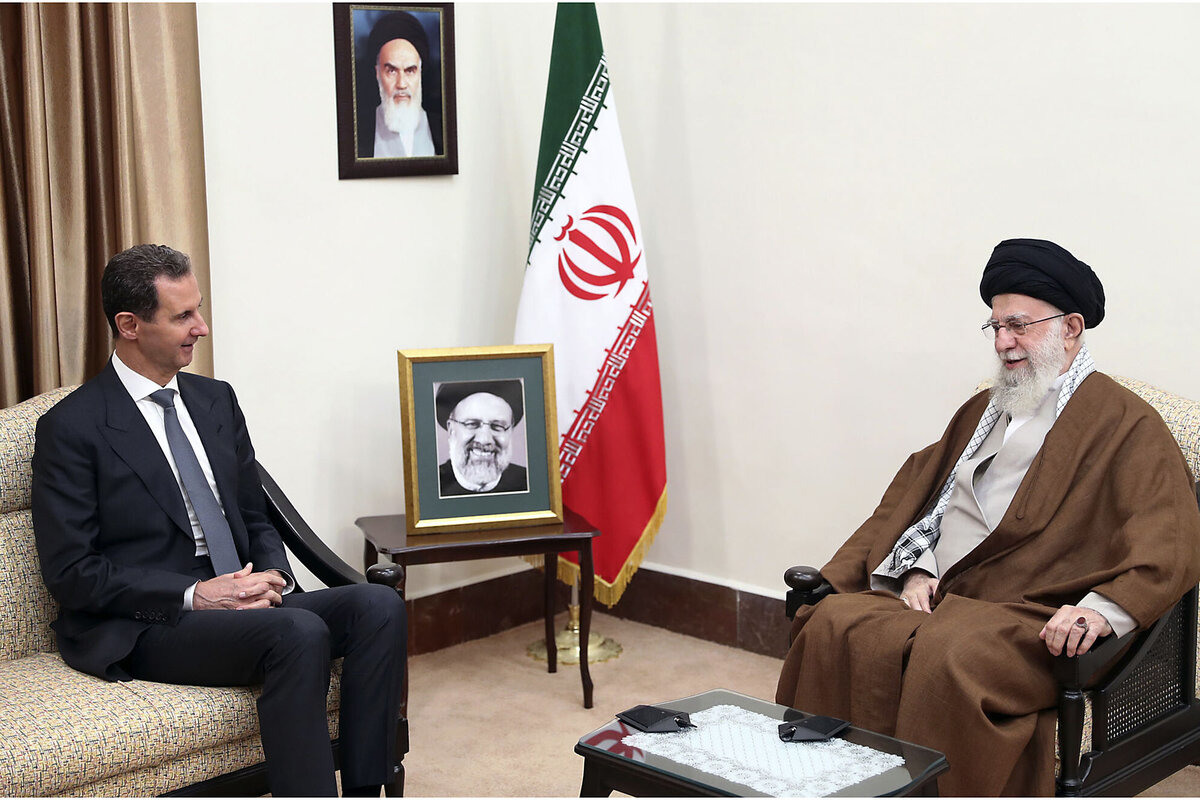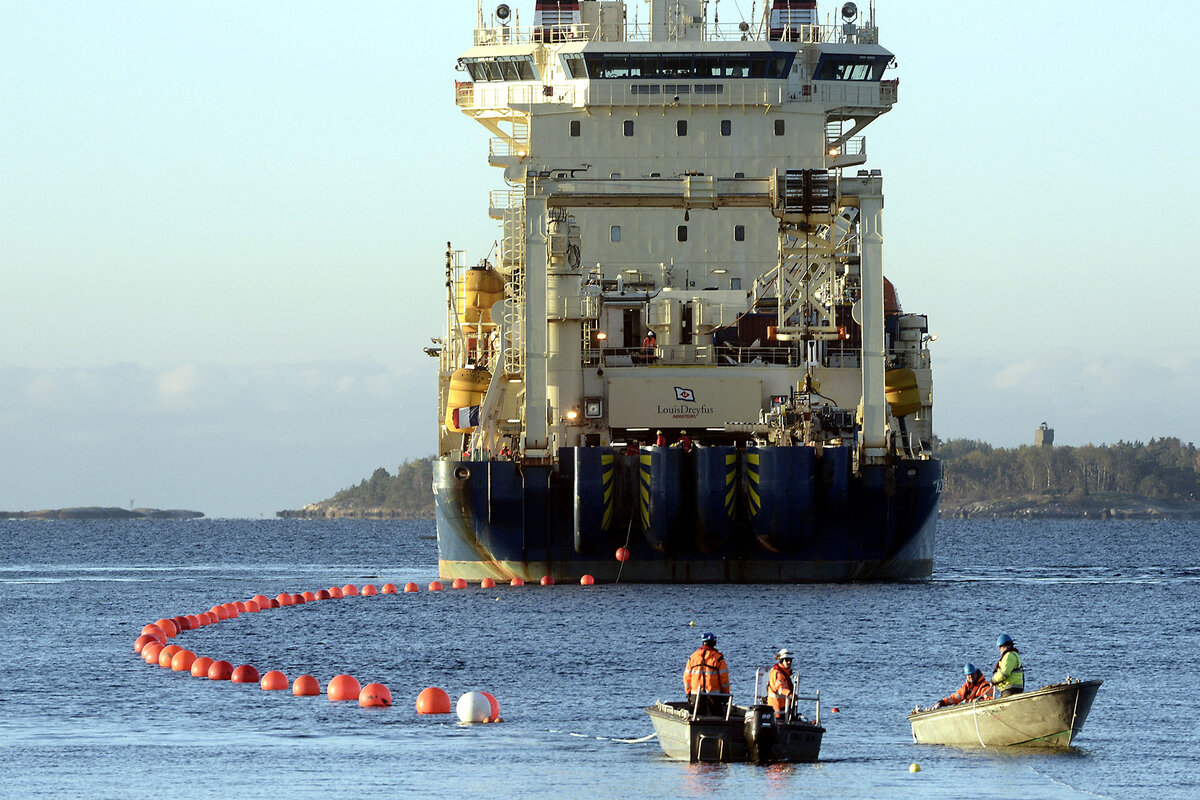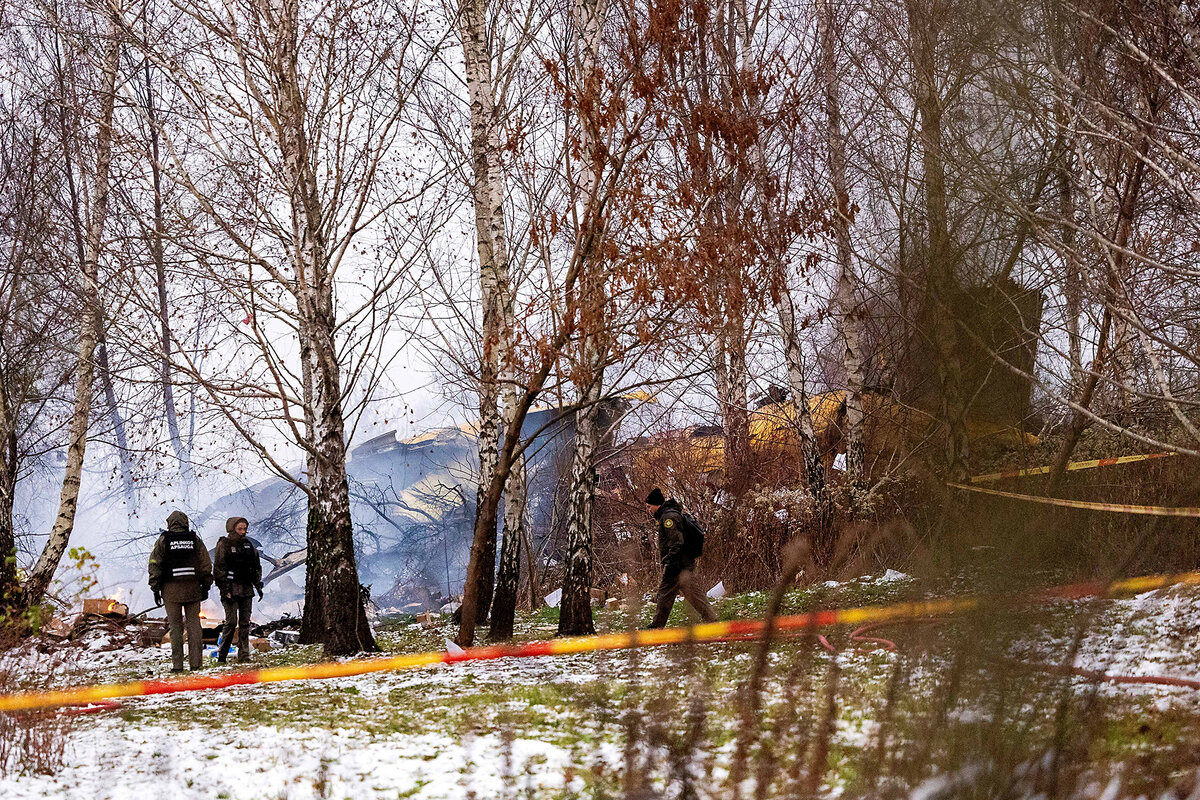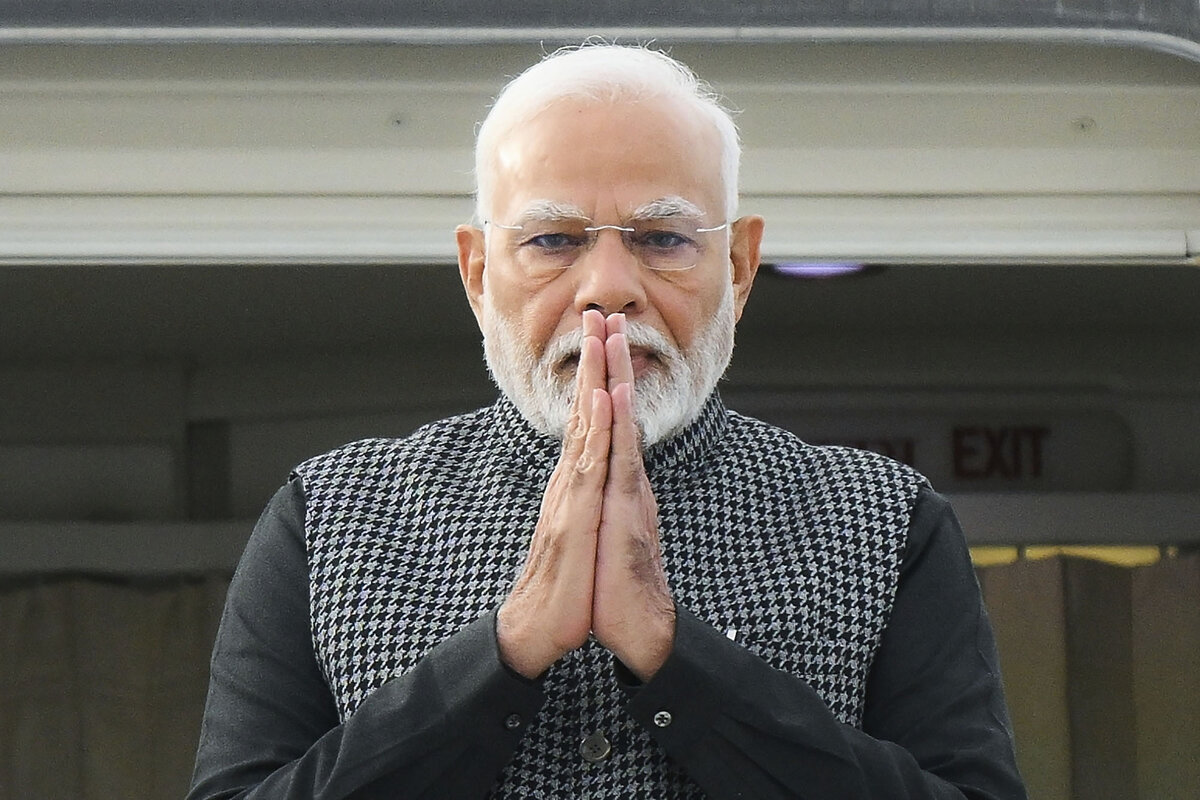- Quick Read
- Deep Read ( 6 Min. )

Why is Christian Science in our name?
Our name is about honesty. The Monitor is owned by The Christian Science Church, and we’ve always been transparent about that.
The Church publishes the Monitor because it sees good journalism as vital to progress in the world. Since 1908, we’ve aimed “to injure no man, but to bless all mankind,” as our founder, Mary Baker Eddy, put it.
Here, you’ll find award-winning journalism not driven by commercial influences – a news organization that takes seriously its mission to uplift the world by seeking solutions and finding reasons for credible hope.
Explore values journalism About usIn Today’s Issue
- As Syrian rebels advance, what can Iran and its tired allies do?
- Today’s news briefs
- How to fight Russian sabotage: With ‘psyops’ and undersea drones
- ‘Bonfire of the incumbents’ unseats governments worldwide in 2024
- Robots and entrepreneurs work to green the US housing industry
- In Malawi, sex and mental health can be taboo topics. Not on this radio show.
Monitor Daily Podcast
- Follow us:
- Apple Podcasts
- Spotify
- RSS Feed
- Download
TODAY’S INTRO
A guide to global tilts
As the United States watches its next administration take shape, political game boards and subterfuge unfold in Syria, the Baltic Sea – and everywhere sitting governments have been unseated of late, something that has happened in more countries than you might think. Today, our writers unpack three stories of international risks and reactions. They weave a remarkable array of perspectives and motives.
Share this article
Link copied.

Help fund Monitor journalism for $11/ month
Already a subscriber? Login

Monitor journalism changes lives because we open that too-small box that most people think they live in. We believe news can and should expand a sense of identity and possibility beyond narrow conventional expectations.
Our work isn't possible without your support.
As Syrian rebels advance, what can Iran and its tired allies do?
What can Iran do to help Syrian President Bashar al-Assad defeat newly energized rebel forces? Its anti-Israel “Axis of Resistance” has been overworked and diminished. Yet even as Iran searches for solutions, there are some suggestions that it is not panicking.

Iran and its alliance of regional militias are seeking once again to defend the embattled regime of Syrian President Bashar al-Assad, as Sunni Islamist rebels make swift territorial gains, from northwest Aleppo south to Hama.
But Iran and its “Axis of Resistance” fighters, chief among them Lebanese Hezbollah, are all degraded and distracted after more than a year of war with Israel.
“This whole thing is coming at the worst moment for Iran and the Axis, and I think also explains the timing on the side of the rebels,” says Hamidreza Azizi at the German Institute for International and Security Affairs.
Nevertheless, there has been consternation but not panic in Iran about the investment of billions of dollars over many years, both to defend Mr. Assad and to create the Axis.
“[Rebels] have taken Aleppo. It’s a loss, for sure. But is this integral to Assad maintaining power? No. Is it integral to Iran’s core interests in Syria? No,” says Mohammad Ali Shabani, editor of the London-based news website Amwaj.media. “I don’t see Iran rushing to Assad’s aid. Not because they don’t want to keep him in power ... but because they want him to better appreciate their role.”
As Syrian rebels advance, what can Iran and its tired allies do?
Iran and its alliance of regional militias are seeking once again to defend the embattled regime of Syrian President Bashar al-Assad, as Sunni Islamist rebels make swift territorial gains in a surprise offensive.
But the array of forces, supported by Russian air power, that prevailed over anti-Assad insurgents and preserved his rule a decade ago during the first phase of Syria’s devastating civil war, is weaker today, and not focused on Syria.
Iran and its regional “Axis of Resistance” fighters, chief among them Lebanese Hezbollah, are all degraded and distracted after more than a year of war with Israel.
Syrian government troops melted away in the face of the offensive launched last week from the rebel-held northwest province of Idlib. Within days, Islamist groups led by Hayat Tahrir al-Sham (HTS), which was once affiliated with Al Qaeda, had captured Syria’s second city of Aleppo.
By Thursday, rebels had taken control of Hama, 80 miles to the south. HTS, designated a terrorist group by the United States, sent messages to Syrian minority groups to reassure them of freedom and protection, prompting Aleppo Christians to put up Christmas decorations.
Nevertheless, there has been consternation but not panic in Iran about the investment of billions of dollars over many years, both to defend Mr. Assad and to create the Axis, which aims to counter Israeli and American influence in the Mideast.

Iran-backed Shiite militias from Iraq reportedly have sent hundreds of fighters to Syria, to help defend an Axis ally that serves as a critical weapons route between Iran and Lebanon. Hezbollah is also trying to mobilize for Syria, but its leadership has been decimated and its units degraded by 14 months of escalating conflict with Israel.
That fight culminated in a ceasefire coming into effect Nov. 27 – the day the Syrian rebels launched their offensive.
“This whole thing is coming at the worst moment for Iran and the Axis, and I think also explains the timing on the side of the rebels,” to take advantage of the relative weakness of Mr. Assad’s allies, says Hamidreza Azizi, an expert on Iran’s role in Syria at the German Institute for International and Security Affairs.
“Compared to a decade ago, Iran has fewer resources to invest in the Axis. ... So I can see why they are quite concerned,” he says.
Two pivotal events have changed the safety net dynamic for Mr. Assad and for Iran, Mr. Azizi says. The first was Russia’s invasion of Ukraine in February 2022, which diverted Moscow’s focus and prompted it to withdraw some troops and hand over some bases to the Syrian army even as it kept an air capability in the country.
The second was the October 2023 attack by Axis-member Hamas on Israel. That triggered Hezbollah’s first rocket strikes on Israel in solidarity, as well as attacks from Iran-backed groups in Iraq and Yemen, ostensibly to stop Israel’s onslaught in Gaza.
“Obviously everybody in the Axis started to get distracted, and focused on the Gaza front, especially those actors whose presence was significant in the Syrian war,” Mr. Azizi says.
Iran’s supreme leader Ayatollah Ali Khamenei complained on X this week that the Sunni extremists were "good news for enemies" of Islam by drawing the world’s attention away from the “issue of Palestine.”
“The current moment [in Syria] shows how significant the Iranian and Iran-backed manpower was, because they were able to prevent further advances by the rebels. But when there is nobody on the ground over those areas, they [the rebels] come again,” says Mr. Azizi. “That’s the problem: Airpower alone can’t secure victory.”

To be sure, Israel has used airstrikes to kill several senior Iranian commanders of the Revolutionary Guard Qods Force, who were responsible for operations in Syria and Lebanon.
“What is Iran capable of doing, and not capable of doing? Clearly its command structure in Syria is damaged,” says Mohammad Ali Shabani, editor of the London-based news website Amwaj.media, which focuses on Iran, Iraq, and Arabian Peninsula countries.
Those networks, steeped in long-standing personal relationships, will take time to reestablish. But Iran can afford its military work in Syria, he says, and does not have an overall manpower problem, considering its past advisory role and the deployment of relatively few of its own troops.
“These are personal relationships that are hard to reconstitute,” says Mr. Shabani, noting for example Gen. Mohammad Reza Zahedi, who was killed by an Israeli airstrike in April on an Iranian diplomatic compound in Damascus.
General Zahedi was in charge of all the Levant and of funneling weapons to Lebanon and Syria. He was reportedly the only non-Lebanese person to sit on Hezbollah’s top Shura Council, while also exercising “veto power” over its subordinate military Jihad Council. His death triggered an unprecedented direct Iranian retaliation against Israel, with 300 missiles and drones.

“Many other, if not all, members of the Jihad Council are [also] dead. So they are all in a state of reconstituting these structures,” says Mr. Shabani, whose website first reported the significance of General Zahedi.
Nevertheless, Mr. Shabani explains why, practically and politically, Iran may not be more urgently coming to Mr. Assad’s aid.
“Do I believe [pro-Assad forces] can seize back all of Syria? No. They couldn’t even do that last year, or last month,” he says. “But is it enough to keep Assad in power? Pick up a map, and look at what Iran’s objectives are in Syria.”
Those objectives include ensuring cross-country routes for Iranian weapons to reach Lebanon and key destinations in Syria, including Damascus, areas close to the Israeli-occupied Golan Heights, and Qusayr, where Hezbollah had a significant victory in 2012.
“[Rebels] have taken Aleppo. It’s a loss, for sure. But is this integral to Assad maintaining power? No. Is it integral to Iran’s core interests in Syria? No,” says Mr. Shabani. “I don’t see Iran rushing to Assad’s aid. Not because they don’t want to keep him in power … but because they want him to better appreciate their role.”
Four days after the rebel offensive erupted, Iranian Foreign Minister Abbas Araghchi flew to Damascus to reassure Mr. Assad. According to news reports, the two detailed the support that needs to be provided for Syria.
In a show of calm, Mr. Araghchi was later filmed eating at a fast-food restaurant in Damascus. But in a diplomatic push, he then flew to Ankara to meet his counterpart from Turkey, which has backed factions of the Syrian opposition.

Iranian media reported Monday that Iranian Qods Force Gen. Javad Ghaffari arrived in Damascus to lead Iranian “military advisers” and help the Syrian army battle the advancing rebels. He has often been lauded in Iran for safeguarding Aleppo in 2016, but earned the title “Butcher of Aleppo” by opponents of Iran who recall brutal tactics there.
In Parliament Dec. 1, Iran’s President Masoud Pezeshkian called on Muslim nations to “intervene and not allow America and Israel to take advantage” in Syria. Yet when asked on state television the next day about the chances of a direct Iranian military engagement in Syria, Mr. Pezeshkian twice dodged the question, and noted instead his government’s diplomatic efforts.
It is not yet clear if several hundred Iran-backed fighters from Iraq have made it to Syria, as reported, or if orders to fight have been given to those members of the Axis already on the ground in Syria, who are mostly Shiite Afghans.
As rebels advanced Thursday, the HTS commander, Abu Mohamed al-Jolani, issued a request to Iraqi politicians to “do their duty” to prevent Iran-aligned militias from intervening “in what is happening in Syria.”

News Briefs
Today’s news briefs
• Georgia opposition leader arrested: Police raid the offices of an opposition party and arrest its leader in an attempt to squelch a wave of protests over the decision to suspend negotiations on joining the European Union.
• Zimbabwe acts on abortion rights: A High Court judge rules that provisions of a law that deny abortion services to girls under the age of 18 and women raped by their husbands are unconstitutional.
• A NATO prompt on defense: Secretary-General Mark Rutte leads a push for European countries to ramp up defense spending. Since Russia invaded Ukraine, NATO’s 32 countries have agreed that they should spend a minimum of 2% of gross domestic product on their military budgets.
• OPEC+ puts off production boost: Eight members of the alliance of oil-exporting countries decide to put off increasing production as they face weaker than expected demand and competing production from nonallied countries.
• Genocide accusation: Human rights organization Amnesty International says Israel’s actions in the Gaza Strip during its war with Hamas amount to genocide. It says Israel has prevented the delivery of humanitarian aid.

How to fight Russian sabotage: With ‘psyops’ and undersea drones
Recent instances of suspected sabotage in Europe don’t necessarily have proven ties to Russia. But it is clear that Vladimir Putin makes a strategy of churning up uncertainty and fear.

- Quick Read
- Deep Read ( 4 Min. )
Western intelligence specialists have been sounding the alarm for months about Russian sabotage in Europe.
In past days, however, Moscow’s suspected campaigns to do everything from infiltrating U.S. military bases to jamming GPS and downing planes have reached “staggeringly reckless” levels, the head of the British intelligence service MI6 recently warned.
That was shortly before a Chinese cargo ship departing Russia dragged its anchor last week, cutting communication cables on the accommodatingly flat, shallow Baltic Sea and raising concerns that Moscow could be teaming up with Beijing to create further chaos.
Western allies will “step up” to address the sabotage, NATO Secretary-General Mark Rutte said during a meeting of the alliance’s foreign ministers on Tuesday. “We cannot be naive,” he said.
Though it is clear that Russian President Vladimir Putin, a former spy, makes a strategy of churning up uncertainty and fear, including through nuclear saber-rattling, it is possible that some of these latest suspected attacks were accidents, security analysts say.
Still, even if there isn’t overt collusion, experts add, anything that creates damage and disruption in the West – and riles up its leaders in the process – is in the shared interest of China and Russia.
How to fight Russian sabotage: With ‘psyops’ and undersea drones

Western intelligence specialists have been sounding the alarm for months about Russian sabotage in Europe.
In past days, however, Moscow’s suspected campaigns to do everything from infiltrating U.S. military bases to jamming GPS and downing planes have reached “staggeringly reckless” levels, the head of the British intelligence service MI6 recently warned.
That was shortly before a Chinese cargo ship departing Russia dragged its anchor last week, cutting communication cables on the accommodatingly flat, shallow Baltic Sea and raising concerns that Moscow could be teaming up with Beijing to create further chaos.
Western allies will “step up” to address the sabotage, NATO Secretary-General Mark Rutte said during a meeting of the alliance’s foreign ministers on Tuesday. “We cannot be naive,” he said.
Though it is clear that Russian President Vladimir Putin, a former spy, makes a strategy of churning up uncertainty and fear, including through nuclear saber-rattling, it is possible that some of these latest suspected attacks were accidents, security analysts say.
“It’s going to be rare that you’ll find the smoking gun,” says Keir Giles, a Russian military expert and senior consulting fellow at Chatham House, a London think tank.
Still, even if there isn’t “actual, overt collusion,” anything that creates damage and disruption in the West – and riles up its leaders in the process – is in the shared interest of China and Russia, he adds. “So we shouldn’t be particularly surprised if they’re looking at each other and thinking, ‘Yeah, this is OK.’”
Undersea drones as “streetlights”
Spies don’t generally seek out the spotlight. Still, as in the United Kingdom, Germany’s chief intelligence officer, Bruno Kahl, came forward in a public hearing to alert lawmakers to Kremlin efforts to drive U.S. military forces from Europe.
Mr. Putin is also determined to “test the West’s red lines” through espionage and sabotage, Mr. Kahl said.

To this end, Russia has taken to using amateur operatives for “snooping around Europe and causing mischief in all of our backyards,” raising the risk of accidental run-ins, Gen. Darryl Williams, head of U.S. Army forces in Europe and Africa, said in October.
MI6 Chief Richard Moore, put it another way: Russian intelligence services, he said, have gone “a bit feral.”
Particularly in more pacifist-learning Germany, some grumbled that these warnings are alarmist. But the point is getting the word out to the general public – with a dash of psychological operations, or psyops.
After all, the recruitment of delinquents shows the desperate lengths Moscow must now go to with the Ukraine war draining its resources, Western intelligence officials point out.
They add that potential recruits may be being duped into activities more dangerous and consequential than they realize.
“Russia is actively looking for low-level criminals to use to do some sabotage actions and stuff,” says Julian Pawlak, research associate at the University of the Federal Armed Forces Hamburg in Germany.
“They don’t need to be against the West or anything,” he adds. “But of course, behind this is a bigger picture, a bigger plan.”
Such public awareness campaigns, like those launched post-9/11, have proved to be successful in the past, says Mr. Giles, who adds that people are more invested in vigilance when the safety of their water supply, plane travel, and connectivity is at stake.
Adm. Pierre Vandier, a top strategic thinker for NATO in Norfolk, Virginia, told Defense News this week that, among other military moves, NATO is planning a network of underwater drones to act as “streetlights,” or CCTV cameras of sorts, to record criminal mischief in oceanic trouble spots.
Better defending critical infrastructure has been a need “known to militaries and researchers, but it was not on the political agenda,” Mr. Pawlak says. Now, he adds, that’s starting to change.

Uncertainty around a plane crash and an undersea cable
In the meantime, investigations into suspected sabotage continue. U.S. military bases across Europe were put on heightened alert for the first time in a decade this summer, reportedly after intelligence surfaced that Russia was plotting attacks on them.
Mr. Putin has denied engaging in sabotage, but sources close to the Kremlin have suggested that Moscow would be justified in attacking U.S. concerns in Germany, Poland, and Romania given that the White House allowed Ukraine to use U.S. long-range missiles to strike across the border into Russia.
Berlin was already looking into fires caused by incendiary devices hidden in packages at a DHL warehouse in Leipzig, Germany, when a DHL cargo plane crashed in Vilnius, Lithuania, last week, killing one crew member.
The crash was immediately suspected of being an act of Russian sabotage.
But Lithuania’s defense minister – no fan of Mr. Putin – said last week that the initial investigation instead indicates a technical malfunction.
As for the anchor-dragging Chinese vessel that cut internet links between Sweden and Lithuania last month, “Nobody believes that these cables were accidentally cut,” German Defense Minister Boris Pistorius said.
The case echoed a similar episode last year, when a Chinese container ship, also dragging its anchor over the Baltic Sea bed, severed a Russian fiber-optic cable.
The vessel’s location points to a potential accident or a “red-on-red fratricide” of sorts, says Mr. Giles.
In fact, he notes, most of the estimated 150 to 200 cable breaks of similar scale around the world each year are accidents.
Focusing on the Baltic Sea as a past and potential future target for Russia means that “Anything that happens there gets a lot of attention,” Mr. Giles says. “But let’s not rule out that this could simply be wild incompetence rather than actual, deliberate conspiracy.”

Patterns
‘Bonfire of the incumbents’ unseats governments worldwide in 2024
2024 was “the year of the election,” with around 70 countries going to the polls. But it also became the year that incumbents fell around the world. Can their replacements offer better solutions to voters’ problems?

- Quick Read
- Deep Read ( 5 Min. )
It will be cold comfort for Kamala Harris. But her loss in the U.S. presidential election in November is typical of a major mood swing in democracies around the world.
From France to South Africa to India, voters have reined in or booted out ruling parties. What had been dubbed “the year of the election,” with voting in about 70 countries, has become “the bonfire of the incumbents.”
While the mix of issues has varied from country to country, voters’ main grievances in nearly all the elections that punished sitting candidates were economic: stagnant or declining incomes, a lack of good jobs, and, above all, inflation.
Incoming governments will find these tough challenges to meet, because many of them stem from a battered world economy still struggling after the 2008 financial crisis, and the inflationary impact of the COVID-19 pandemic and the Ukraine war.
The French government’s effort to stanch its budget deficit took a blow this week when opposition parties – which have a parliamentary majority – brought President Emmanuel Macron’s prime minister down.
The one newcomer who does seem to be enjoying some success is the most radical – the libertarian Javier Milei in Argentina, who has slashed public spending in his campaign to bring down 13% monthly inflation. That has won him popular support since his election in November of last year.
‘Bonfire of the incumbents’ unseats governments worldwide in 2024

It will be cold comfort for Kamala Harris. But American voters’ verdict in November – denying her the White House, and the Democrats a majority in both chambers of Congress – is typical of a major mood swing in democracies around the world.
The past 12 months have been dubbed “the year of the election.” A record number of voters have made their voices heard in some 70 countries. And in ballot after ballot, they’ve been reining in, or booting out, ruling parties.
The year of the election has become “the bonfire of the incumbents.” That’s true in the United States, as well as in European countries such as Britain and France. It’s also the case in in South Africa, where the ruling African National Congress lost its majority for the first time since the end of apartheid, and in Botswana, which has a new ruling party for the first time since independence 58 years ago.
In Asia, Narendra Modi’s Bharatiya Janata Party was unexpectedly stopped short of an outright parliamentary majority in India. Meanwhile, in South Korea this week, the president tried and failed to impose martial law in the wake of significant gains by the main opposition party in this year’s parliamentary elections.
With voters’ mood showing no signs of brightening in the new year, the impact of the anti-incumbent surge is being felt not only by the politicians, like Ms. Harris, who were sent packing.

There are signs – which the incoming Trump administration might well want to monitor – that the election winners are now finding themselves on the clock.
They face two daunting challenges.
The first is political: restoring democracy’s fundamental bond between governments and the governed. They know that if they fail, they, too, might find themselves on the bonfire.
The second is potentially even tougher. It’s about policy: addressing the main reasons for voters’ growing anger.
For while the mix of issues has varied from country to country, voters’ main grievances in nearly all the elections that punished incumbents were economic: stagnant or declining incomes, a lack of good jobs, and, above all, inflation.
And there is another hurdle that these governments have to surmount. Although they might be tempted to turn inward and get their own economic houses in order, the causes of much of the dissatisfaction are to be found abroad, in a battered world economy.
That economy is still recovering from multiple shocks, including the 2008 financial crash as well as the supply chain and inflationary effects of the pandemic and the Ukraine war.

Real wages in all the leading world economies are still lagging behind pre-Ukraine war levels, according to the United Nations International Labour Organization.
How, or whether, Donald Trump might pull back from some of his campaign pledges – steep import tariffs, for instance, could risk further fueling inflation – will become clear only once he takes office. He does enjoy one benefit that other newly elected world leaders can’t count on. The U.S. economy remains the largest and strongest in the world.
Still, the destabilizing effect of the anti-incumbent mood currently gripping voters is a concern for other politicians on the world stage.
Leaders in both Britain and France have been struggling to find a way to keep voters onside while also addressing serious weaknesses in their economies.
French President Emmanuel Macron still has a few years left in his final term. But his party took a battering in parliamentary elections this year, which has left him relying on the support of the far-right party of Marine Le Pen.
On Wednesday, she and her supporters in Parliament joined left-wing legislators and brought the government down in a no-confidence vote for the first time in 60 years.

In Britain, Labour Prime Minister Keir Starmer should be on much stronger ground. His party was handed a huge parliamentary majority when voters there called time on 14 years of Conservative Party rule in July.
Yet ever since his government unveiled tax rises and spending cuts aimed at reinvigorating a stagnant economy, his poll numbers have nose-dived.
Appointing a new head of the civil service this week, he sounded a note of urgency, clearly aware of the need to achieve real change before too long: “nothing less,” he declared, “than the complete rewiring of the British state to deliver bold and ambitious long-term reform.”
In gauging his chances of pulling that off, he may be casting an eye toward another beneficiary of voters’ growing anger. It is a leader from the opposite side of the political spectrum, on the opposite side of the world.
Argentine President Javier Milei, a flamboyantly outspoken libertarian, won power late last year in a landslide victory on the promise of a root-and-branch remaking of government to rescue the country’s crisis-ridden economy.
He, like Mr. Starmer, has sensed the need to move quickly and show results.
He has already managed a three-quarters reduction in inflation, which had been raging at a rate of 13% a month, in part by eliminating half of the government’s ministerial departments and slashing public spending by one-third.
Some of the spending cuts have reduced state subsidies on basic goods and services, vital for a large number of Argentines. Poverty is on the rise.
The key question will be whether the voters will stick with him, even in the face of economic pain, at least in the short term.
Yet so far at least, not only has he avoided a Starmer-like collapse in his poll numbers. His popularity is on the rise.

Robots and entrepreneurs work to green the US housing industry
The carbon-intensive U.S. construction industry is scrambling to help ease a nationwide housing shortage. Startups are trying to find climate-friendly solutions, but the challenges they face are emblematic of the barriers to industrywide change.

- Quick Read
- Deep Read ( 5 Min. )
A growing number of startups are trying to reinvent the U.S. homebuilding industry, with big goals of making it both more efficient and more climate-friendly.
It is a disruption that many say is past due. The construction industry is not only struggling to meet housing needs but also is one of the country’s largest emitters of greenhouse gases. According to clean energy think tank RMI, U.S. home construction produces 50 million tons of carbon emissions per year, equivalent to entire countries such as Norway or Peru.
Massachusetts-based Reframe Systems is among the new companies hoping to change one of the nation's largest industries. Reframe is developing a “next generation” modular construction method to build high-efficiency housing. Employees follow instructions on iPads to install plumbing and electrical components into robot-made walls, then transport these modules to construction sites, where they are stacked into multifloor units.
But the challenges are myriad. Despite a huge influx of investor funding, the share of housing stock built through high-tech modular construction remains small.
“It’s very easy, especially in the Silicon Valley mindset, to dramatically underestimate how human and analog the construction industry still is,” says Tyler Pullen, a senior technical adviser at the University of California Berkeley.
Robots and entrepreneurs work to green the US housing industry

A crowd has gathered to see a robot build a house.
In a concrete-and-steel factory in Andover, Massachusetts, yellow-vested consultants, sustainable builders, and possible investors strain to see past a clear fence. Behind the barrier, a giant blue arm jutting from the floor comes to life.
Its sensor-covered hand analyzes a pile of wood before emitting a loud hiss, then carefully suctions a two-by-four. Rotating at the shoulder and extending its elbow, the robot methodically delivers the plank to a partially completed wall.
On the other side of the factory – about the size of a hangar for small planes – a few human workers are on their lunch break. They are employees of a three-year-old company called Reframe Systems, which is one of a growing number of startups across the United States scrambling to reinvent the homebuilding industry.
It is a disruption that many say is past due. The construction sector is struggling to meet a pronounced housing shortage and is also one of the country’s largest emitters of greenhouse gases. U.S. home construction produces 50 million tons of carbon emissions per year, equivalent to entire countries like Norway and Peru, according to clean energy think tank RMI.
Venture capitalists have invested billions of dollars in companies with big promises to fix both of these problems. More than 100 startups have entered the industry in the past two decades, according to estimates by Tyler Pullen, a senior technical adviser at the Terner Center for Housing Innovation at the University of California Berkeley. He says there are likely more than 200 construction innovation companies currently doing business in the U.S.
Like many of these, Reframe is focused on a new form of modular construction to upend one of the county’s largest industries. The company aims to create affordable, net-zero houses, which generate the same or more energy than they consume. Reframe CEO Vikas Enti says he can deliver a hefty return to investors – all while making a significant dent in the housing and climate crises. The next step, he says, is to build a factory that can produce 500 apartment units per year using lessons learned from his small, pilot factory in Andover. Then, he hopes to build a network of facilities across the country, varying their sizes to meet the demands and needs of their region.
“There’s about 2,000 Home Depots across the country today,” Mr. Enti says. “We see a world where, for every 10 Home Depots, there’s one Reframe microfactory.”
So far, Reframe has completed one two-bedroom house.

The big dreams of the modular housing industry
The challenges, many in the field point out, are myriad.
The current model for modular construction – using assembly-line technologies to build homes – has its origin in the period after World War II. With veterans returning home, and the homebuilding industry hollowed out by the Great Depression, the federal government turned to mass-produced housing to combat a massive shortage. But federal support for the movement dwindled, and in recent years, modular construction companies have mostly focused on the luxury housing market and sustainability-focused buyers.
Despite the huge influx of financing, the share of housing stock built through high-tech modular construction remains very small. Two billion-dollar modular construction firms that had attracted investor excitement, Katerra and Veev, both closed in the past four years.
“It’s very easy, especially in the Silicon Valley mindset, to dramatically underestimate how human and analog the construction industry still is,” says Mr. Pullen.
Modular’s role in addressing the housing and climate crises
Still, the need for companies like Reframe is clear, modular boosters say.
Many experts and policymakers are increasingly sounding an alarm about a growing shortage in the U.S. housing market. Depending on methodology, the size of the shortfall ranges widely, but it is always huge: from 1.5 million to 7.3 million housing units, according to the Harvard Joint Center for Housing Studies. At the same time, energy consumed by residential buildings is responsible for around 15% of all U.S. emissions. Fossil fuels warm most of the country’s roughly 145 million apartment units and houses, in addition to keeping their stoves running and heating water.
Global leaders recognize the need for change, too. The construction and operation of all buildings – not just residential – produce over a third of global emissions. Leaders attending the COP29 global climate summit announced on Nov. 13 a new initiative to spur construction of net-zero buildings.
Reframe was founded by roboticists who used to work at Amazon. Following instructions on iPads, its human employees insert plumbing and electrical wiring into the robot-made walls, turn them into “modules,” and bring them to construction sites, where they are stacked into multifloor, highly energy-efficient homes. Because the iPad instructions are akin to a Lego or Ikea manual, Reframe can employ fewer high-cost, high-skill laborers.
Having most of the needed professionals – electricians, plumbers, architects, engineers – under the same roof solves a problem of communication Mr. Pullen sees as endemic to the traditional construction industry. Every different professional involved must work together, but they are all “masters of their own kingdom,” he says.
While not all companies offer net-zero buildings like Reframe, Mr. Pullen says building in a factory setting lends itself to tighter structures that hold their temperature better. Plus, factory construction results in less waste. Companies know what they need to order for hundreds of projects at once; in traditional building, ad hoc orders require far more trucks and often leave behind excess material like piping and drywall.
All of this was appealing to Kathy McGilvray.
She is working with Reframe to build a three-story, modular home for her parents on a lot that she owns in Somerville, Massachusetts. There will be three units – one for them, one for her sister, and a rental.
A conventional new home would be “prohibitively expensive” for her, says Ms. McGilvray.
Reframe will build pieces of the triplex at its factory in Andover over four or five months, then assemble them at the site in Somerville over two or three months.
“My parents could move in in May. So, it’s extraordinary,” says Ms. McGilvray.
On top of that, her parents, who are on a fixed income, barely need to pay utilities for the all-electric, solar-powered triplex.
Despite the enthusiasm, modular companies have yet to establish significant pipelines of projects, and few are constructing the large apartment complexes that might put a dent in the housing shortage.
“History is replete with people who had the goal of doing this and didn’t do it, which doesn’t mean that somebody someday won’t do it,” says Christopher Herbert, managing director of the Harvard Joint Center for Housing Studies. “But it’s hard. It’s hard to get to that scale.”

Difference-maker
In Malawi, sex and mental health can be taboo topics. Not on this radio show.
Many young people in Malawi find there’s no space to discuss sensitive issues. The intimate medium of radio has the power to change that.

- Quick Read
- Deep Read ( 5 Min. )
-
By Kang-Chun Cheng Contributor
The weekly radio show “Spot On: Kalikonse Tikadziwe” takes on topics that are taboo in the village of Undi and throughout Malawian society. Today’s subject is menstruation.
Lee Chatata, a producer for Farm Radio Trust, reads from a script, engaging a group of assembled women with questions about the stigma related to having a period. “What challenges do girls face when they’re menstruating?” Mr. Chatata asks.
Several young women, some toting infants on their hips, take turns responding.
“There are difficult cultural beliefs, such as how a girl on her period isn’t allowed to cook or put salt in the relish,” says Alefa Biziel, who has a baby girl.
“At school, boys laugh at the girls when they find out she is on her period,” Tiyanane Samuel chimes in.
“The lack of sanitary pads is hard,” Bridgette Kachala says. All the women nod.
Listeners around the country are encouraged to phone in to Farm Radio Trust’s call center afterward with thoughts or questions, thus continuing the dialogue. Each episode reaches 5 million listeners.
In Malawi, sex and mental health can be taboo topics. Not on this radio show.
Seated beneath the branches of a massive African fig tree, the audience of nearly 25 women is listening intently. A solar panel set up not far away powers the devices that Lee Chatata, a producer for Farm Radio Trust, is using to tape the program in this makeshift recording session.
Called “Spot On: Kalikonse Tikadziwe” (meaning “To Know Everything” in Chichewa, the local language), the weekly radio show tackles topics that are taboo in the village of Undi and throughout Malawian society. Today, the subject is menstruation.
Mr. Chatata reads from a script, engaging the assembled women with questions about the stigma related to having a period.
“What challenges do girls face when they’re menstruating?” Mr. Chatata asks. Several young women, some toting infants on their hips, take turns responding.
“There are difficult cultural beliefs, such as how a girl on her period isn’t allowed to cook or put salt in the relish,” says Alefa Biziel, who has a baby girl.
“At school, boys laugh at the girls when they find out she is on her period,” Tiyanane Samuel chimes in.
“The lack of sanitary pads is hard,” Bridgette Kachala says.
All the women nod.
“I was afraid”
Undi, in the central Ntchisi District, is just one of the many remote, underserved villages in this southeastern African nation. More than half of Malawians live below the poverty line. The average monthly income for informally employed residents in rural places such as Undi – where more than 80% farm for a living – is 90,000 kwacha (about $50). Buying sanitary pads, which cost around 1,900 kwacha for a pack of 10, on a monthly basis is typically out of the question. Most women and girls in Undi instead use fabric strips cut from traditional wrap skirts.

When Ms. Biziel got her first period, the changes in her body were met with something akin to vitriol by older women in her community. At age 12, she was called before her parents, who berated her. Now that she was a woman, they said, she was expected to behave. “You’re not supposed to be sleeping with men; you have to learn to control yourself,” Ms. Biziel recalls her mother saying.
There was no mention of how to manage painful menstrual cramps or how to keep herself clean and comfortable – particularly given the lack of privacy at Chasembe, the local school. The outdoor latrine there is dirty and smelly, Ms. Biziel explains, which is one reason that some girls drop out of school when their periods start.
“There was so much I wanted to ask my mother about what a lady should do,” Ms. Biziel continues. “But I was afraid.”
Ms. Biziel married her husband when she was 18 years old and gave birth to their daughter that same year.
Many young Malawians rush into marriage, particularly those who say they experienced abuse at home as girls. And many parents wish to marry off daughters early so that they can bring in food or money through a dowry, explains Rebecca Samuel (no relation to Tiyanane Samuel). “I was banned from seeing my friends until I found a husband,” she says.
Uplifting communities
“Spot On” episodes are recorded in the mostly rural Ntchisi and Dowa districts, and in Lilongwe District, which includes the capital. Listeners around the country are encouraged to phone in to Farm Radio Trust’s call center afterward with thoughts or questions, thus continuing the dialogue. Each episode reaches 5 million listeners.
The Canadian nonprofit Farm Radio International, the umbrella organization for Farm Radio Trust, was established in the early 1980s by radio broadcaster George Atkins, who hoped to use radio programming to uplift communities in the Global South, says Ian Pringle, Farm Radio International’s senior director of programs.
“Atkins really believed in the power of radio for rural communities, primarily agricultural,” Mr. Pringle explains in a phone call from Ottawa, Ontario, where he is based.
Born in 2009, Farm Radio Trust has always been “a truly local, indigenous communications program,” Mr. Pringle notes. “It was never directly funded by [Farm Radio International]. We have collaborations, of course. But it was never run by foreigners.”
George Vilili, Farm Radio Trust’s CEO, says that it didn’t take long for the Malawian team to notice radio’s potential beyond addressing farming topics. Listeners generally resided in remote outposts, facing high unemployment rates and virtually no access to social services. “Our first project in 2013 was on mental health and issues that young people face, which include suicide, teenage pregnancy, questions around sexuality,” says Mr. Vilili, speaking by phone from Lilongwe. “There wasn’t a space for discussions on these topics.”

Generational gaps proved to be another hurdle. “Parents didn’t like youth discussing taboo topics like sex in their absence, but that’s what the youth want,” Mr. Vilili continues. During site visits to record programs, Farm Radio Trust steps in to mediate discussions with parents – patiently explaining the purpose of broaching taboos.
Kantambo Longwe, a communications specialist with the United Nations, works with Farm Radio Trust on agricultural and community initiatives, including radio programs, toll-free call centers, and text messages to raise awareness on issues concerning water, sanitation, and hygiene. Mr. Longwe praises Farm Radio Trust’s collaborative work.
“This collaboration has helped the areas where FRT has been working,” he says.
“FRT is actually doing it, not just talking,” says Mr. Pringle, who visits Malawi every couple of years. In addition to radio programs, Farm Radio Trust offers pop-up clinics in villages, often in partnership with grassroots nongovernmental organizations.
“It’s hard to talk about contraceptives,” Mr. Pringle says. “But to actually duck into the tent and be there to see the services [that Farm Radio Trust’s partners] offer: an injection, implant, condoms – a young Malawian kid can walk out with an understanding of why and how to use them, all in a confidential space.”
Rebecca Samuel says that women have listening parties for “Spot On.” Though she herself married last year at age 16, girls in the area are starting to reject early marriages and to chat about sensitive issues.
“We’re more educated now,” Ms. Samuel says. “I hope to do things a bit differently with my own daughter.”
Other headline stories we’re watching
(Get live updates throughout the day.)The Monitor's View
The new stoic Argentine
- Quick Read
- Deep Read ( 2 Min. )
-
By the Monitor's Editorial Board
A standard tool kit to assess a nation’s economy includes the prices of daily goods, the number of people looking for jobs, and the output of factories. Argentina may be operating under a new metric: a citizen patience index.
The reason is that a country where roughly 60% of people have relied on the state for services is conducting an experiment in economic and political transformation. A year ago, voters elected Javier Milei, a self-styled “anarcho-capitalist,” as president. He promised to rein in the size and scope of government. Since then, he has slashed public spending and eliminated nearly a dozen government ministries.
One pollster is now asking people: “How much longer can you wait for President Milei to improve the economic situation?” The answer is surprising.
The poverty rate spiked to 52.9% during Mr. Milei’s first six months, from 41.7% during the latter half of 2023. Yet his public approval has risen. Nearly 1 in 2 Argentines support the president’s agenda. Similar polls indicate rising levels of patience and trust.
Mr. Milei’s talk about freedom has “made a difference for a lot of people,” says Juan Ignacio Folco, an agriculturalist.
The new stoic Argentine

A standard tool kit to assess a nation’s economy includes the prices of daily goods, the number of people looking for jobs, and the output of factories. Argentina may be operating under a new and softer metric: a citizen patience index.
The reason is that a country where roughly 60% of people have relied on the state for services is conducting a dramatic experiment in economic and political transformation. A year ago, voters elected Javier Milei, a self-styled “anarcho-capitalist,” as president. He promised to radically rein in the size and scope of government. Since then, he has slashed Argentina’s vastly bloated public spending, vetoed funding increases for pensions and education, and eliminated nearly a dozen government ministries.
One pollster is now asking people: “How much longer can you wait for President Milei to improve the economic situation?” The answer is surprising.
Against all predictions to the contrary, his plan seems to be working. Monthly inflation was down to 2.7% in October from 25.5% last December. Since April, wages have outpaced prices. For the first time in 12 years, the country has a budget surplus.
His austerity measures have come with political risks, namely impatience. The poverty rate spiked to 52.9% during Mr. Milei’s first six months, from 41.7% during the latter half of 2023. Yet his public approval has risen. Nearly 1 in 2 Argentines support the president’s agenda, an AtlasIntel survey conducted for Bloomberg shows. Similar polls indicate rising levels of patience and trust.
Overall, more than 60% of Argentines said they did not think it was unreasonable to wait at least through the midpoint of Mr. Milei’s four-year term for his reforms to bring positive change.
Rising degrees of patience reflect a society eager to move from dependency on government to individual agency. Younger voters in particular were drawn by Mr. Milei’s promises of less taxation or, as he told The Economist, “the power to be the architect of your own life.”
Mr. Milei’s talk about freedom has “made a difference for a lot of people,” Juan Ignacio Folco, an agriculturalist, told the Monitor. Javier Pinto Kramer, a manager at a seed and fertilizer company, said, “The country is in patience mode.”
For soccer-loving Argentines, another analogy may be even more apt. In June, when the national team was on its way to winning the Copa América tournament, captain Lionel Messi described his team’s philosophy: “We have patience to have the ball and find the spaces.” After decades of economic turmoil, many Argentines are patiently watching for new openings to make economic progress.

A Christian Science Perspective
Each weekday, the Monitor includes one clearly labeled religious article offering spiritual insight on contemporary issues, including the news. The publication – in its various forms – is produced for anyone who cares about the progress of the human endeavor around the world and seeks news reported with compassion, intelligence, and an essentially constructive lens. For many, that caring has religious roots. For many, it does not. The Monitor has always embraced both audiences. The Monitor is owned by a church – The First Church of Christ, Scientist, in Boston – whose founder was concerned with both the state of the world and the quality of available news.
What are we assuming?
- Quick Read
- Read or Listen ( 4 Min. )
-
By Lisa Rennie Sytsma
Holding to the truth of God’s goodness equips us to overcome unhelpful temptations and experience our God-given health and harmony.
What are we assuming?
It was disappointing. I’d been assuming that the beautiful wildflowers that had been springing up in the meadow belonged there. But they turned out to actually be an invasive species. This bad news had come through a notice asking people to pull the plant up whenever they saw it.
It struck me that the notice could be applied to our thinking, too. Sometimes thoughts flit about that initially appear to be appealing, reasonable, even good. In the moment, it can feel reasonable to give in to a temptation to be selfish, uncaring, or sinful. But those thoughts are ultimately destructive.
A temptation seems reasonable only when we accept the false assumptions underlying it. So the trick is to watch what we’re assuming.
We’re constantly confronted with the claim that evil is present and that therefore good is absent. We assume we lack, for instance, love, right relationships, supply, health, happiness, or holiness. If we accept these beliefs, we can then be tempted to look to some material remedy to meet the supposed lack – an app for loneliness, a get-rich-quick scheme to fill seemingly empty pockets, maybe a pill to relieve ill health.
In the third chapter of the Bible’s book of Genesis, a talking serpent invited Eve to eat fruit from a forbidden tree. It did this by suggesting that the fruit would make Adam and Eve “as gods” by giving them knowledge of both good and evil. They never questioned the serpent’s false claims.
First, it was claiming that evil was a reality to be known. Since God created all reality, this meant God would have had to have created evil as well as good. Then, the serpent claimed, God made the knowledge of evil a prerequisite for Godlikeness. The serpent concluded that God hid this knowledge from Adam and Eve because He didn’t want them to be Godlike.
The first chapter of Genesis assures us that God made all things good and created His children in His image and likeness – that is, not as gods, but wholly Godlike. God did not, could not, create an invasive species in the form of a serpent to oppose or contradict Him. So the serpent itself must have represented Adam and Eve’s own underlying false assumption that there was something beyond God, good, and all that He made to know or to have.
When we’re confronted with temptation, are we questioning the assumptions that make up the temptation? Or are we agreeing with the claims that make the temptation sound good? If we find ourselves fighting temptation through willpower, it’s a sign that we have accepted the serpent’s claim that God’s good isn’t infinite, ever present, and already ours; that there’s something else outside of His creation that we need or want.
If a hardworking student is, despite diligent study and preparation, assuming she’s a fallible mortal who could flunk an important test without outside aid, the temptation to cheat might sound good. But if she recognizes that, in reality, she is spiritual, immortal, and reflects all of the intelligence and understanding of God, the one infinite Mind, cheating won’t even be a temptation. Similarly, someone who understands that, in the words of the discoverer of Christian Science, Mary Baker Eddy, “honesty is spiritual power” (“Science and Health with Key to the Scriptures,” p. 453) sees no reason to tell lies.
“Just change your assumptions!” doesn’t always feel easy to do. Fortunately, we don’t have to do it alone. Christ, the divine manifestation of God, is always working with us to destroy false assumptions. Our job is to listen for Christ’s voice pointing out, not just wrong thoughts we may be indulging, but the assumptions underlying those thoughts. Once the underlying false beliefs have been rooted out and replaced with the true understanding of our forever unity with our Father-Mother God and of His forever care for us, temptations no longer sound reasonable.
“The kingdom of God is within you,” Christ Jesus insisted (Luke 17:21). We all have within us the innate understanding and consciousness of the reality and presence of God, Truth – of infinite good. Studying the Bible and Mrs. Eddy’s writings develops and strengthens that consciousness.
And when we hold to the light of this understanding and see through false assumptions, those invasive mental species, or temptations, will no longer look good or beautiful. And we’ll see the reality of the health and holiness that are truly native to us filling our lives.
Adapted from an editorial published in the Nov. 11, 2024, issue of the Christian Science Sentinel.

Viewfinder
A US presidential visit

A look ahead
Thanks for diving into your Daily today. For tomorrow, we’re working on a story about the reopening of the Notre Dame Cathedral in Paris, shuttered since its fire in 2019. And two veteran politics writers will join our “Why We Wrote This” podcast to talk about how empathy and humility help anchor them in their work.



